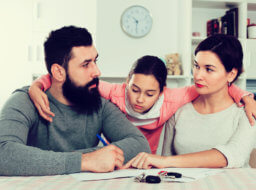- HOME
- PSYCH SERVICES
- BUSINESS & PERFORMANCE PSYCHOLOGY
- CLINICAL, COUPLES, & FAMILIES
- ADHD Treatment & Evaluation Services
- Anger Management
- Anxiety Treatment & Evaluation Services
- Borderline Personality Treatment Services
- Cognitive Behavioral Therapy (CBT) Self-Help
- Couples Counseling and Marital Therapy
- Consent for Psychological Services for Minors Post-Divorce
- Depression Treatment Services
- Infidelity Recovery
- Jacksonville Counseling and Psychology
- Military Psychology & Tricare
- Narcissistic Personality Treatment Services
- Online Counseling
- Psychoeducational Testing
- Psychological Testing and Assessment
- Psychotherapy & Counseling
- FORENSIC PSYCHOLOGY & EXPERT TESTIMONY
- LIFE COACHING & EXECUTIVE COACHING
- PSYCHOLOGICAL PUBLIC DISABILITY QUESTIONNAIRES (DBQ)
- ONLINE COURSES
- Our Partnership Begins When You Purchase an Online Course
- Get to Know Dr. D’Arienzo, Relationship Expert
- Florida Premarital Preparation Online Course
- Georgia Premarital Education Online Course
- TwogetherinTexas Premarital Online Course
- Tennessee Premarital Preparation Online Course
- Minnesota Premarital Education Course Online
- Oklahoma Premarital Counseling Online Course
- South Carolina Premarital Preparation Course
- West Virginia Premarital Education Course
- Online Marriage and Relationship Tune Up Course
- Florida DCF Certified Parent Education and Family Stabilization Online Course
- Georgia Qualified Parent Education and Family Stabilization Online Course
- Texas Qualified Parent Education and Family Stabilization Online Course
- High Conflict Co-Parenting Online Certificate Course (8 Hours)
- Online Anger Management Four Hour Course (Level 1)
- Online Anger Management Eight Hour Course (Level 2)
- Sexual Harassment Online Training
- MMPI/GUARD/LEO
- CPI Police and Public Safety Assessment
- G License Psychological Testing
- Online Psychological Testing for Armed Security Guards and Personal Protection Officers
- MMPI Texas Level III CSO and IV PPO Psychological (ONLINE)
- Requirement for Texas Security License Applicants: MMPI Evaluation
- Level 3 Security Guard New Mexico Online MMPI Psychological Evaluation
- TEAM
- SOCIAL MEDIA/BOOKS
D'Arienzo Psychology Blog
Transitioning to Parenthood Is Not Easy

Posted by: Dr. Justin D'Arienzo, Psy.D., ABPP
According to psychologists and social learning theory, most couples undergo changes in roles and demands along with the challenges to balance other new parent responsibilities. The precarious transition leads to a decrease in relationship functioning and increase in specialization of parental roles.
Tricare Therapy

Posted by: Dr. Justin D'Arienzo, Psy.D., ABPP
If you are looking for qualified Tricare-approved mental health providers, then D’Arienzo Psychology is the place for you and your family. Dr. D’Arienzo is a former Navy Psychologist. D’Arienzo Psychology has multiple Tricare mental health providers to include a psychologist (Dr. David Gilliland), three clinical social workers (Dr. Dawn Dirito, Mr. Joe Zichi, and Ms. Jenny Lehman), and one licensed mental health counselor (Mr. Alan Lipzin).
Minnesota Premarital Course Online

Posted by: Dr. Justin D'Arienzo, Psy.D., ABPP
Dr. D’Arienzo is a Board-Certified Clinical Psychologist, National Relationship Expert, and Ordained Minister in Minnesota. As of 2020, Dr. D’Arienzo is offering an Online Minnesota Premarital Course. Taking our course will help you lead a lifetime of marital bliss and save $75 on your Minnesota Marriage license. Take our course today for only $30.
Minnesota Premarital Education Course

Posted by: Dr. Justin D'Arienzo, Psy.D., ABPP
Dr. D’Arienzo is a Board-Certified Clinical Psychologist, National Relationship Expert, and Ordained Minister in Minnesota. Dr. D’Arienzo is now offering an Online Minnesota Premarital Course. Taking our course will help you lead a lifetime of marital bliss and save $75 on your Minnesota Marriage license. Take our course today for only $30.
19 Florida Counties that Require an Original Premarital Preparation Course Certificate

Posted by: Dr. Justin D'Arienzo, Psy.D., ABPP
Upon completing our Florida Online Premarital Course, you will receive a certificate. When you present your certificate to your local courthouse, you will receive $60 off of your marriage license. A lot of Florida counties do not require an original certificate, however, 19 counties require an original hard copy in the mail. These counties include Alachua, Bradford, Desota, Dixie, Flagler, Gulf, Hernando, Highlands, Leon, Levy, Monroe, Nassau, Okaloosa, Okeechobee, Pasco, Polk, Putnam, Seminole, and Taylor.
How Do Children React to Divorce?

Posted by: Dr. Justin D'Arienzo, Psy.D., ABPP
If you are going through a divorce with children, you must receive proper co-parenting education. Children of divorced parents are more likely to suffer adverse effects than children with parents that are together. Children with divorced parents are more likely to have mental health issues, engage in risk-taking behaviors, suffer guilty feelings, lose interest in social activities, and lose faith in marriage. Purchase our High-Conflict Co-Parenting Course to learn how parents can work together to protect the well-being of their child(ren).
Anger and COVID-19
Posted by: Dr. Justin D'Arienzo, Psy.D., ABPP
Our lives took an unexpected turn when COVID-19 destroyed any sense of normalcy in our lives. With COVID-19 came a lot of emotions, anger being one of them. One form of anger coping mechanism is called displacement. Displacement is a transfer of emotions from one specific issue to another.
Consent for Psychological Services for Minors

Posted by: Dr. Justin D'Arienzo, Psy.D., ABPP
Dr. D’Arienzo is a licensed Clinical Psychologist and National Forensic Expert. In this article, he discusses consent for minors regarding healthcare. Dr. D’Arienzo discusses psychological services in divorce and separation cases. It might appear harmless when a divorced parent takes their child to receive psychological services. This can lead to many dilemmas, like parents not agreeing on treatment plans for their child.
Getting Married During the COVID-19 Pandemic
Posted by: Dr. Justin D'Arienzo, Psy.D., ABPP
Getting married during a global pandemic can pose many issues that couples did not expect. Our article outlines ideas that couples can implement to have a safe wedding celebration during a pandemic. We also outlined five tips for planning a honeymoon during a global pandemic. D’Arienzo Psychology wants you to have a safe wedding celebration and honeymoon that couples can enjoy.
Psychology of Returning Our Children to School During the COVID-19 Pandemic?
Posted by: Dr. Justin D'Arienzo, Psy.D., ABPP
COVID-19 changed many aspects of our personal and professional lives. One way that COVID-19 changed our personal lives is that our children left brick-and-mortar schooling. As schools start to open back up, this article discusses the psychology of parents returning their children to school. Dr. D’Arienzo outlines how parents can make the best decision for their children.




